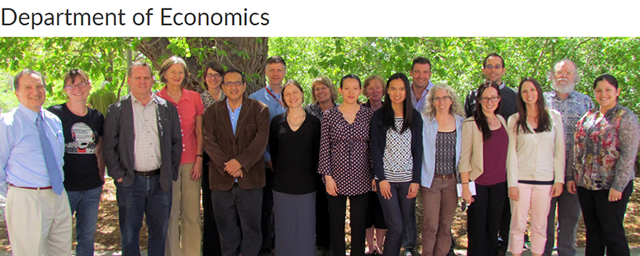
Economics ETDs
Publication Date
Spring 5-2020
Abstract
Adolescents are slowly being recognized as a generation, worldwide, that may require different policy approaches to improve staggering statistics on their failing wellbeing, including mental health. By providing the support to allow the next generation to achieve better mental health outcomes, they are going to be more economically successful and the future economic growth of nations can be better assured. In face of such a need, this dissertation approaches the evaluation of a number of key stressors and elements of coping and support. Each chapter produces results which overcome limitations throughout existing literature in terms of the simultaneous consideration of both rigorous econometric-based analyses and strong conceptual frameworks. Each chapter also contains relevant policy implications and recommendations which are believed to hold good promise for improving the relevant adolescent mental health problems addressed in each respective chapter.
Chapter 2 addresses the issue of connections between mobile-based health (mHealth) interventions aimed at improving the wellbeing of adolescent and evidence of negative wellbeing/mental health outcomes. We investigate this using primary data from a large-scale, school-based survey of older adolescents in southwestern Nepal, to assess this tension between mobile/smartphone usage as a true mobile health (mHealth) opportunity in Nepal or as a potential problem, introducing additional deleterious wellbeing effects from over-use. Founded in Basic Psychological Needs Theory (BPNT), robust results of analyses using full structural modeling approaches (and traditional regression-based sensitivity analyses) indicate support for the BPNT framework in explaining statistically significant associations between bullying and wellbeing outcomes, including evidence to support the mediating role of problematic mobile phone use.
Chapter 3 expands consideration of adolescent mental health to across the developing world, where suicide has become a leading cause of all adolescent deaths. Using data from the Global School-based Student Health Survey (GSHS) of six different countries, analysis involves estimation of a reduced-form, simultaneous model incorporating specialized clustering to determine the influence of both positive and negative components of social integration on five different deleterious health outcomes, including three levels of suicidal behavior. Robust results indicate that positive parenting and social exclusion reduce and increase the likelihood of all outcomes, respectively, among both pooled and individual country samples. Such results provide an impetus for pursuing interventions in LMICs, including those aimed at suicide prevention, which focus on social-based, multi-level approaches.
Finally, Chapter 4, examines a particularly stressful situation faced by female adolescents in regions such as Nepal. Informed by the Transactional Model of Stress and Coping, this chapter evaluates the roles that cultural and school environments play in appraisals of menstruation as a major life stressor and the impacts of emotional stress on missing school. Using primary survey data from schools in both the Terai and Hill areas of Nepal, conditional mixed-process (CMP) estimation with fixed effects, utilizing multiple index building techniques, including principle component and multiple correspondence analysis were performed. Robust results are found in support of the theoretical framework, showing that strong cultural norms during menstruation increase the probability of girls self-reporting as feeling lonely, while presence of hygiene supporting infrastructure at schools reduces this outcome. Furthermore, there is strong support for the hypothesis that the presence of emotional stress during menstruation increases the likelihood of not only missing school, but for a longer period of time.
Degree Name
Economics
Level of Degree
Doctoral
Department Name
Department of Economics
First Committee Member (Chair)
Alok K. Bohara
Second Committee Member
Brady P. Horn
Third Committee Member
Richard Santos
Fourth Committee Member
Andrew S. Rowland
Language
English
Keywords
mHealth, adolescent suicide, menstruation and school attendance, problematic mobile phone use (PMPU), primary data
Document Type
Dissertation
Recommended Citation
Yilmaz, Siobhan K.. "Adolescent Mental Health In the Developing World: Three Economic Analyses on Stressors, Coping, and Support." (2020). https://digitalrepository.unm.edu/econ_etds/117


